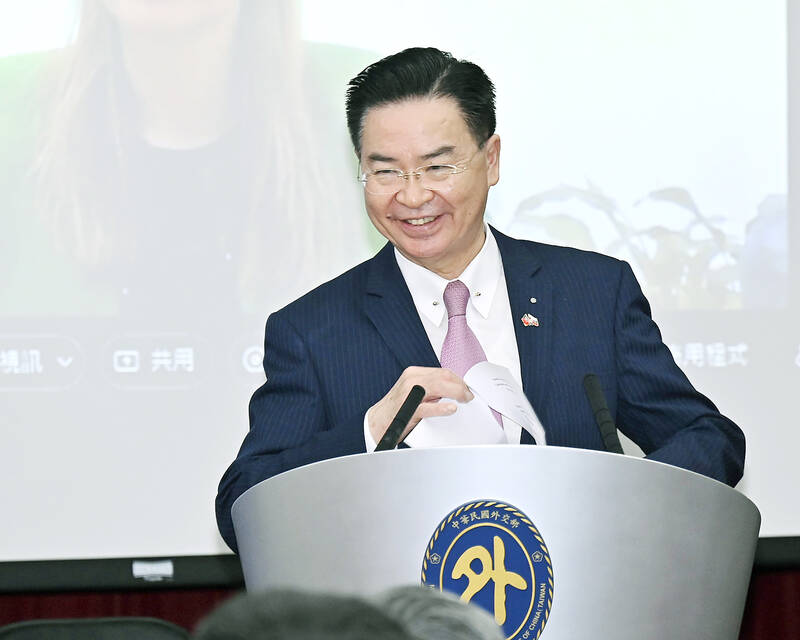Taiwan might lengthen the duration of work visas and open a path to permanent residency for Filipino workers to expand the nation’s migrant workforce, Minister of Foreign Affairs Joseph Wu (吳釗燮) said.
He made the remarks during an interview with the Manila-based English-language newspaper Philippine Star published yesterday.
As of April, Taiwan was home to 154,000 Filipino migrant workers who made up 21 percent of the legal migrant workforce, Ministry of Labor data showed.

Photo: Tu Chien-jung, Taipei Times
“The discussion has been under way for some time. And they [Filipino workers] might even be able to apply for permanent residency here in Taiwan,” Wu was quoted as saying.
“That is under discussion, but I won’t be able to give you the details before decisions are made,” he added.
Filipino workers are “an integral part of Taiwanese society” and their presence in Taiwan is appreciated, Wu said.
Manila could consider granting visa-free entry privileges to Taiwanese travelers to reciprocate the proposed extension to Filipino workers, Wu said.
“If the Philippine government can do that, I am sure it will make it so much more convenient and easy for Taiwan to consider the extension of visa[-free entry for Filipinos],” he said.
Taiwan’s visa-free entry program covering Philippine travelers is to expire at the end of next month. The two governments are to re-evaluate the program for renewal, the newspaper said.
Regarding rising tensions between Manila and Beijing, Wu said Taiwan and the Philippines should enter some form of security cooperation, as the two countries face the same threat.
Wu refused to elaborate on the nature of possible security cooperation, saying that he cannot talk about details of possible arrangements, but the issue is “one of the areas we should think about.”
Collaboration in coast guard operations and disaster response are other areas where cooperation is possible, he said.
Taiwan welcomes the US’ decision to bolster the defense capabilities of the Philippines by various means, including establishing new military installations under the Enhanced Defense Cooperation Agreement, Wu said.
Asked if setting up additional US bases in the Philippines could be seen as provocative by Beijing, he said: “What is causing provocation in this region is China’s expansionism.”
Should China attack Taiwan, the Philippines could be the next target in Beijing’s cross hairs, Wu said.
“We think that the best way for us at this moment is for Taiwan and other claimants of the South China Sea to enter into peaceful research of the natural resources or engage in scientific endeavors together or jointly develop the resources,” he said.
Taipei hopes that Taiwan-Philippines relations would improve under Philippine President Ferdinand Marcos Jr, whose calls for regional peace and stability were welcomed by many Taiwanese, he added.
“As long as there is a desire on the part of the Philippines, Taiwan will be there to work together with the Philippines,” Wu said, adding that the Philippines is the nation’s closest neighbor.

CHAOS: Iranians took to the streets playing celebratory music after reports of Khamenei’s death on Saturday, while mourners also gathered in Tehran yesterday Iranian Supreme Leader Ayatollah Ali Khamenei was killed in a major attack on Iran launched by Israel and the US, throwing the future of the Islamic republic into doubt and raising the risk of regional instability. Iranian state television and the state-run IRNA news agency announced the 86-year-old’s death early yesterday. US President Donald Trump said it gave Iranians their “greatest chance” to “take back” their country. The announcements came after a joint US and Israeli aerial bombardment that targeted Iranian military and governmental sites. Trump said the “heavy and pinpoint bombing” would continue through the week or as long

TRUST: The KMT said it respected the US’ timing and considerations, and hoped it would continue to honor its commitments to helping Taiwan bolster its defenses and deterrence US President Donald Trump is delaying a multibillion-dollar arms sale to Taiwan to ensure his visit to Beijing is successful, a New York Times report said. The weapons sales package has stalled in the US Department of State, the report said, citing US officials it did not identify. The White House has told agencies not to push forward ahead of Trump’s meeting with Chinese President Xi Jinping (習近平), it said. The two last month held a phone call to discuss trade and geopolitical flashpoints ahead of the summit. Xi raised the Taiwan issue and urged the US to handle arms sales to

BIG SPENDERS: Foreign investors bought the most Taiwan equities since 2005, signaling confidence that an AI boom would continue to benefit chipmakers Taiwan Semiconductor Manufacturing Co’s (TSMC, 台積電) market capitalization swelled to US$2 trillion for the first time following a 4.25 percent rally in its American depositary receipts (ADR) overnight, putting the world’s biggest contract chipmaker sixth on the list of the world’s biggest companies by market capitalization, just behind Amazon.com Inc. The site CompaniesMarketcap.com ranked TSMC ahead of Saudi Aramco and Meta Platforms Inc. The Taiwanese company’s ADRs on Tuesday surged to US$385.75 on the New York Stock Exchange, as strong demand for artificial intelligence (AI) applications led to chip supply constraints and boost revenue growth to record-breaking levels. Each TSMC ADR represents

State-run CPC Corp, Taiwan (CPC, 台灣中油) yesterday said that it had confirmed on Saturday night with its liquefied natural gas (LNG) and crude oil suppliers that shipments are proceeding as scheduled and that domestic supplies remain unaffected. The CPC yesterday announced the gasoline and diesel prices will rise by NT$0.2 and NT$0.4 per liter, respectively, starting Monday, citing Middle East tensions and blizzards in the eastern United States. CPC also iterated it has been reducing the proportion of crude oil imports from the Middle East and diversifying its supply sources in the past few years in response to geopolitical risks, expanding